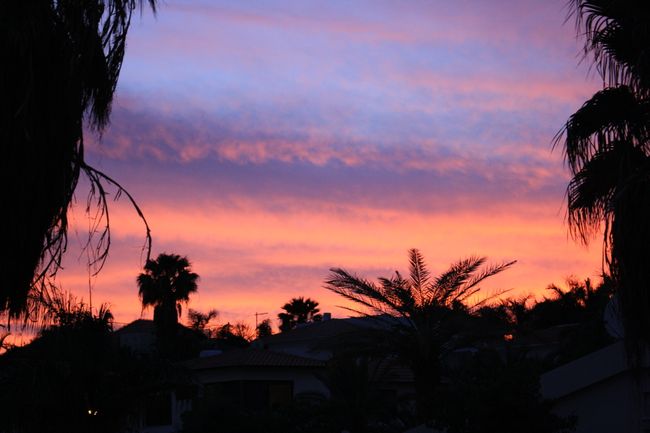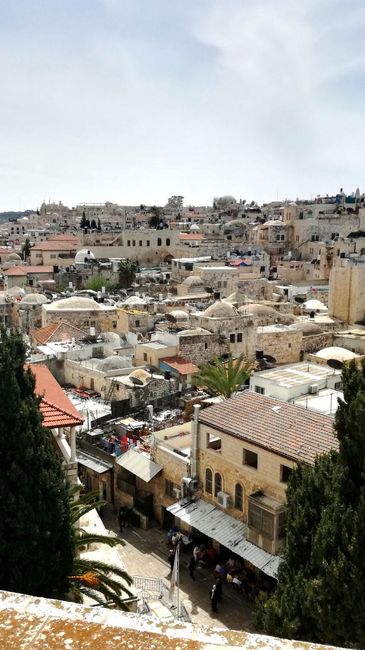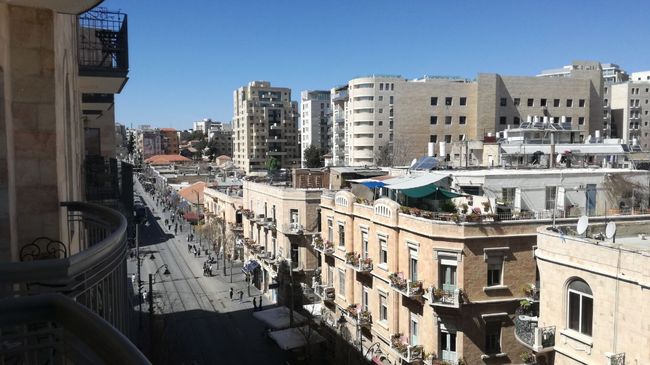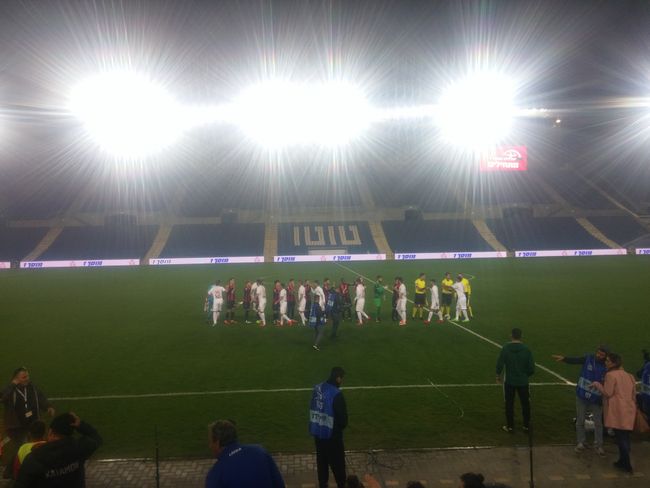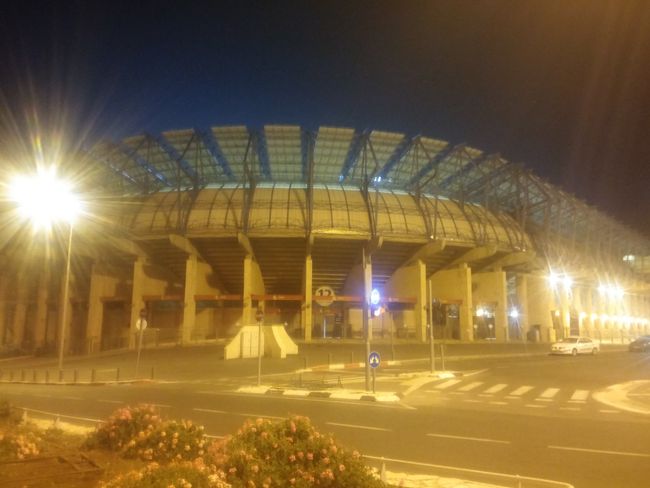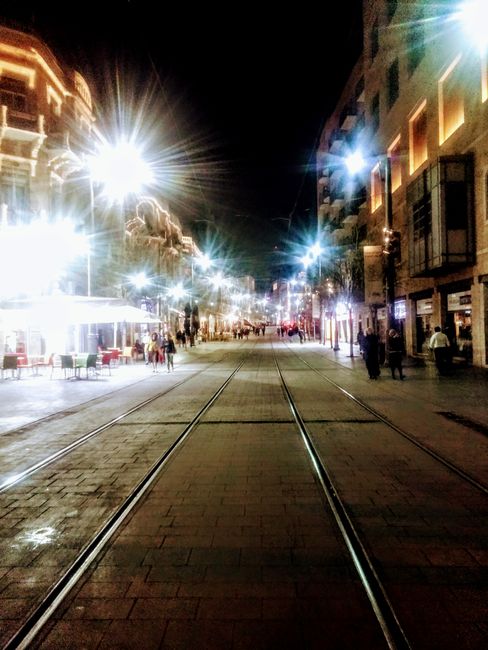Day 6: Transfer to Jerusalem
La daabacay: 08.04.2018
Ku biir Wargeysyada
Today we are going to Jerusalem, one of the most significant cities in the world. Once again, we leave early to go to the train station. The train that will take us to Tel Aviv is a red double-decker. The same model is used by the German railway as a regional express train. The only real difference is that the Israeli trains are equipped with carpet, which makes them much more comfortable. From Tel Aviv, we continue by bus. This bus travels along a large part of the route parallel to the newly built railway line. There is already a train connection between the two cities, but the new train will be operated electrically, which will save a lot of costs. The old diesel locomotive consumes a lot of fuel when it has to overcome the 800 meters of altitude that separate Jerusalem from Tel Aviv and the sea. We could also feel this increase, as our bus drove on the emergency lane during the journey. Apparently, the engine had overheated. After two or three minutes of tension, we were fortunately able to continue.
Arriving in Jerusalem, we take the tram to our apartments.
In Jerusalem, there is actually only one tram line, the "L1". It has been in operation since 2011. Its route leads through both Jewish and Arab neighborhoods, thus connecting the city in a special way. Since there is only one line, it is not difficult to guess where the ticket inspectors will look for fare evaders. Just after one stop, the first ticket inspector taps us on the shoulder. Standing next to us is a group of travelers who obviously come from the USA. They try the classic trick of pretending not to know that they also have to stamp the tickets, but the ticket inspector seems to be familiar with that already.
In the apartments, we only briefly drop off our luggage. We want to get a first impression of the city before watching a game of "Hapoel Katamon Jerusalem" in the evening. In Jerusalem, there are significantly more men with yarmulkes and orthodox Jews to be seen than in Haifa or Tel Aviv. The presence of the military and private security personnel is also significantly higher. At the same time, Jerusalem also presents itself as a very touristic city. People from all over the world walk through the streets. We are constantly asked if we would like to have dinner in any of the restaurants.
The city is clearly divided into various neighborhoods, with the change of districts being clearly recognizable (similar to Tel Aviv).
Another distinct difference is the low number of vacant buildings. While in Tel Aviv and Haifa there are unused, often dilapidated buildings everywhere, almost everything is used in Jerusalem.
For lunch, we go to "Pinati". The place was recommended by people who have been here before and was supposedly advertised by the Katamon fans. The place does not disappoint! The hummus with meat is excellent.
(By the way: The attentive reader will have noticed that the type of dishes we eat is not very varied. However, it should be said that hummus tastes different, but always good, in all its forms. What they all have in common in Israel is that they are a thousand times better than anything you can buy as hummus in a German supermarket, for example. So, it is by no means monotonous to always eat "the same thing".)
The hummus with meat was so delicious that one of our group members ordered a second plate.
Afterwards, we go to the meeting point where some "Hapoel Katamon" fans have already gathered. The club has a somewhat atypical history. The fans we are with were actually fans of "Hapoel Jerusalem", a club that stood for socialist values and came from the labor movement. However, in the early 2000s, there were many conflicts with the club's owner. The fans then tried to buy the club, but unfortunately, it failed. Large parts of the fan scene now wanted to try a new start elsewhere and switched to a fourth division club, which then also bore the name "Hapoel Katamon Jerusalem". But even this club was quickly abandoned in order to finally found a completely independent club. This club started playing in the fifth division and quickly worked its way up. Attempts to merge the two clubs failed. Currently, "Hapoel Katamon Jerusalem", the new club, is playing in the second division. "Hapoel Jerusalem" has meanwhile been relegated to the third division and has lost a lot of relevance, which is particularly evident in the low number of spectators. Interestingly, the fan bases of the two clubs continue to go to the same basketball team and support it together, which apparently works quite well. There has been contact with fans of SV Werder Bremen since a fan exchange in 2008. Since then, there has been regular contact between the fan bases, which should also be promoted today. So, we either get to know each other again or chat with old acquaintances about recent events before we take taxis towards the stadium. During the drive, our taxi driver is extremely annoyed by a car that is driving 20 km/h slower than the speed limit in front of us. He quickly overtakes the car on the right, gets in front of it, and slows down to 20 km/h. The car behind us tries to avoid him by changing lanes, but our driver blocks every single one of them. After a while, he lets the car drive next to us. He rolls down the window and exchanges a few kind words with the other driver, who then indicates that he has noted down our license plate. When we finally continue driving, the driver turns to us and chuckles, "I hope you enjoyed the show," to which we of course nod and smile back.
"Hapoel Katamon" plays at the "Teddy Kollek Stadium". It was named after a former mayor of the city. The stadium is currently used by four different football clubs. In addition to the old and new "Hapoel" clubs, "Beitar Jerusalem" also plays here.
The club is mainly known for its racist and Islamophobic fans. Until 2013, there was not a single Muslim player who ever played for the team. Those who have been there since then left the club within a short time because they were constantly insulted and mocked by their own fans. This is something that the fans are proud of. At games, it is often called out when the team enters the field: "Here they come, the most racist team in the country." So, it is not surprising that there is little sympathy between "Beitar" and "Hapoel Katamon". In fact, "Hapoel Katamon" has a relatively long tradition of Arab players, which is not well received by "Beitar", in addition to the club's left-liberal attitude and that of its fans.
However, there are few points of contact in the stadium and therefore little tension. This could change, however, if "Hapoel Katamon" is promoted to the first division, where "Beitar" already plays. This brings us directly to today's game: If Katamon wins tonight, they have a real chance of making it to the playoffs and thus fighting for promotion to the first division. To actually be promoted, they would still have to win the playoffs, which would be a long way to go. But still, it would be nice to at least have the opportunity.
When we arrive at the stadium, we are guided past the small queues at the gates by a club employee and allowed into the stadium, where we naturally first take a look at the merchandise. A few scarves, t-shirts, and sweaters are bought. Unfortunately, there is no room in the backpack for the backgammon game. For me personally, a jersey catches my eye. At €25, I consider it a fair price, considering that a jersey in Germany can easily cost between €80 and €100. Only the main stand of the stadium is open, which is not surprising. In general, football in Israel does not attract so many fans. The estimated 400-500 people who are there today is already a good average for the second division. Even in the first division, the four-digit mark is not always reached.
So, the "Teddy Stadium" with its 30,000 seats is actually almost empty, and we are looking at completely empty stands. At first, I don't see any away fans either, until one of the Katamon fans points out to me that they are standing slightly to the right behind us. In many other stadiums, one would not often see two different sets of fans on one stand, but here it seems to work quite well today. "Hapoel Marmorek" from a small city about an hour away from Jerusalem is the away team today. A good busload of fans has traveled with them. The active part of the Katamon fan scene is located at the level of the center line in the lower block. There are two drums, a large flag with the logo of the leading Ultra group, and several small flags, some of which also contain political statements. One, for example, is designed in rainbow colors and draws attention to the rights of homosexuals. They consciously refrain from using a megaphone, which makes sense considering the number of people. The atmosphere is still good, and the team is loudly supported.
"Hapoel Katamon" dominates the game from the beginning and takes the lead after about 30 minutes. There are countless chances to expand this lead, but unfortunately none of them are converted. Five minutes before the end, then the shock: the goalkeeper makes a mistake after a standard free kick. Now it is an undeserved 1-1. The mood is immediately down, but support continues. "Hapoel Katamon" now gives it their all. There are several actions towards the goal, but most of them end as miserably as before the equalizer. The end of injury time has long been reached when "Katamon" approaches the goal again. In an indescribable wild scramble, four players manage to somehow push the ball over the line. The referee blows the final whistle. The dream of the first division lives on! A grand celebration breaks out, shaking the stadium. Sometimes the house is on fire, no matter how many people there are.
We go back with the taxis. Near our accommodation, we quickly have "Memulawach". A Yemenite dish that is similar to a wrap filled with various vegetables, egg, fried onions, and various sauces. The dough is like a mixture of pancakes and puff pastry. What an amazing meal! Healthy and incredibly delicious. This is really a great alternative to the usual fast food junk. Can someone please bring this to Germany?
Ku biir Wargeysyada
Jawaab

